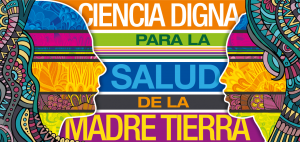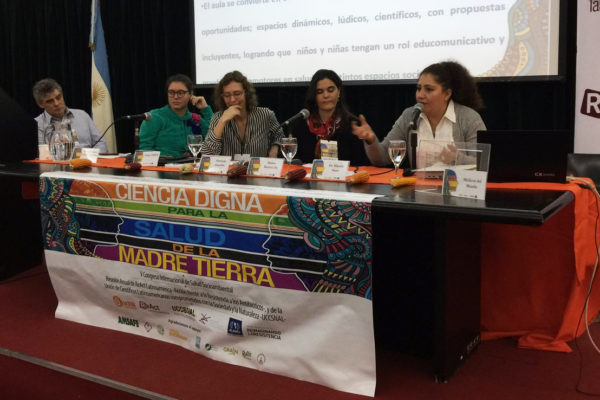2019-06-13
Beginning June, ReAct Latin America co-hosted the second Mother Earth conference in Rosario, Argentina. During five days different challenges in regards of human health and ecosystems were addressed and linked to communities, the use of antibiotics and antibiotic resistance.

The five meeting days were convened by ReAct Latin America, the Institute of Socio-environmental Health at National University of Rosario, the Union of Scientists Committed to the Society and Nature of Latin America (UCCSNAL) and the International Society for the Improvement of the Use of Medicines (ISIUM).
Human health and ecosystems
During these five days, the different problems of human health and ecosystems were addressed and linked to communities, the use of antibiotics and antibiotic resistance.
A variety of topics were discussed:
- the health of the planet
- the importance of ecosystems for health care
- violence against women
- the need to learn from bacteria – how to generate harmonious relationships
- shared intelligence and community wisdom regarding antibiotic use
- human rights
- the importance of bacteria for all living creatures
- what is medicine
- what is health
- the need to integrate community knowledge in the Community Action Plans.
Damián Verzeñasi, Director of the Institute of Socio-environmental Health of the National University of Rosario, convening and hosting the event said:
“Health cannot be synonymous with attention to the disease. We need to build health systems that think about integrality, that build territories that allow human beings, microorganisms and ecosystems to live in a healthy relationship.”
Discussions on environmental issues

The presentations and discussions focused on the environmental problems and how they affect human health.
Topics such as:
- the use of pesticides
- the loss of biodiversity
- the contamination of water and air with pesticides
- evidence of the substantial changes caused in the ecosystems
- antibiotics in regards of production and consumption of healthy foods and
- contributions to the spread of resistance genes.
The richness of the meeting days came from the opportunity to share evidence, knowledge and experiences of the subjects mentioned. Community experience applying knowledge and evidence generated by science for areas such as production of food, care of the soil, air and water and a healthy environement were highlighted as practices that should be be implemented in other spaces.
Behavior change through the classroom
ReAct Latin America’s educational material, Alforja Educativa, was one of the outstanding practices discussed at the conference. Educational material in the classroom – via the Child to Child strategy – has been a tool to change children’s perception of the bacterial world, their knowledge of antibiotic use and the need to take care of the environment to maintain health.
The video “The voices of childhood” was presented, showing the commitment by children from different parts of the world to care for the planet and to see health for humans, animals, plants, ecosystems as one.
In the same spirit – health promotion in the classroom – the experience of school gardens in Formosa implemented by the Ministry of Health of Argentina (in which ReAct Latin America participates with content) about the microbial world was presented.
Diversity among participants
In addition, the diversity of participants and participants at this meeting is worth noting. Professionals and researchers of human health, sociologists, anthropologists, veterinarians, teachers, community leaders, human rights defenders, environmentalists, organizations of academics and social organizations were present to address these issues and propose changes that allow progress under the One Health paradigm.
Workshops to include concepts to Community Action Plans
Several workshops were held to reflect and construct documents that will incorporate community wisdom and ancestral knowledge into the Community Action Plans and strategies to address antibiotic resistance. These were a continuation of the earlier dialogues held in Ecuador and Bolivia.
More news and opinion from 2019
- ReAct’s 2019 wrap up and 2020 expectations
- Blog post by UNDP and ReAct: Antimicrobial resistance: An emerging crisis
- Water, sanitation and hygiene services critical to curbing antibiotic quick fix
- Diagnostics: Antibiotic susceptibility
- ReAct highlights during World Antibiotic Awareness week 2019
- 2019 AMR photo competition prizes announced
- Launch of UNICEF’s institutional guidance on antimicrobial resistance
- Proposed ban on colistin for animal use announced in Indonesia
- School children led celebration of World Toilet Day and World Antibiotic Awareness Week
- 10 Innovate4AMR-winning teams enjoyed 3-day workshop in Geneva
- After 4 collaborative meeting days: Actions for the future in Latin America
- Four key points from joint comments to One Health Global Leaders Group on AMR
- Why are children more vulnerable to AMR?
- Dr Yoel Lubell, Health Economist, on Thailand, AMR, UCH and cultural factors driving AMR
- UHC and AMR: The Thai Experience
- Why do effective antibiotics matter for quality of care and patient safety?
- New ReAct policy brief: Antimicrobial resistance and universal health coverage – What’s the deal?
- Three key takeaways from the ReAct Africa conference
- Diagnostics: Species identification
- AMR-specific indicator proposed for monitoring Sustainable Development Goals
- Five focus areas at the 2nd Ministerial Conference on AMR hosted by the Netherlands
- Safety concerns of fecal microbiota transplants
- Upcoming ReAct Africa Conference: universal health coverage and antimicrobial resistance in focus
- Mother Earth conference in Argentina – the environment in focus
- Diagnostics: What are we talking about?
- Connecting global to local civil-society-agenda on AMR at CSO convening in Geneva
- ReAct colleagues featured in WHO Bulletin as leading profiles in the work on reacting to antibiotic resistance
- RAN stakeholder at WHO IPC consultation – for standards and guidelines in African Union member states
- WHA conversation on Antibiotic Resistance as a Global Development Problem co-organized by ReAct
- Insights from ReAct Asia Pacific project on antibiotic stewardship in secondary level hospitals in India
- Open letter to UN Member States from former IACG members Anthony So and Otto Cars
- ReAct UHC Intervention at UNGA Multi-stakeholder Hearing for High-level Meeting on UHC
- ReAct Latin America honors Earth Day
- Medicines Patent Pool’s view on the role of licenses for antibiotics – World Intellectual Property Day
- Second time for Innovate4AMR competition!
- World Health Day 2019: Universal Health Coverage
- Diagnostics: Constraints for successful implementation
- Antibiotic Shortages: magnitude, causes and possible solutions: A new WHO meeting report
- Erry Setyawan, FAO, on Indonesian NAP: We need to work together to make it possible to manage AMR
- ReAct’s new 5-year strategic plan receives funding from Sida
- How infections spread and how to stop them
- Generating data for policy and practice
